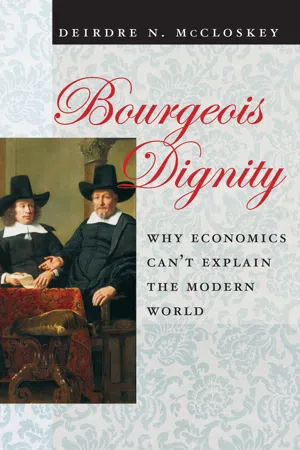
- English
- ePUB (mobile friendly)
- Available on iOS & Android
About This Book
The big economic story of our times is not the Great Recession. It is how China and India began to embrace neoliberal ideas of economics and attributed a sense of dignity and liberty to the bourgeoisie they had denied for so long. The result was an explosion in economic growth and proof that economic change depends less on foreign trade, investment, or material causes, and a whole lot more on ideas and what people believe.Or so says Deirdre N. McCloskey in Bourgeois Dignity, a fiercely contrarian history that wages a similar argument about economics in the West. Here she turns her attention to seventeenth- and eighteenth-century Europe to reconsider the birth of the industrial revolution and the rise of capitalism. According to McCloskey, our modern world was not the product of new markets and innovations, but rather the result of shifting opinions about them. During this time, talk of private property, commerce, and even the bourgeoisie itself radically altered, becoming far more approving and flying in the face of prejudices several millennia old. The wealth of nations, then, didn't grow so dramatically because of economic factors: it grew because rhetoric about markets and free enterprise finally became enthusiastic and encouraging of their inherent dignity.An utterly fascinating sequel to her critically acclaimed book The Bourgeois Virtues, Bourgeois Dignity is a feast of intellectual riches from one of our most spirited and ambitious historians—a work that will forever change our understanding of how the power of persuasion shapes our economic lives.
Frequently asked questions
Information
Table of contents
- Cover
- Copyright
- Title Page
- Dedication
- Contents
- Preface and Acknowledgments
- 1. The Modern World Was an Economic Tide, But Did Not Have Economic Causes
- 2. Liberal Ideas Caused the Innovation
- 3. And a New Rhetoric Protected the Ideas
- 4. Many Other Plausible Stories Don’t Work Very Well
- 5. The Correct Story Praises “Capitalism”
- 6. Modern Growth Was a Factor of at Least Sixteen
- 7. Increasing Scope, Not Pot-of-Pleasure “Happiness,” Is What Mattered
- 8. And the Poor Won
- 9. Creative Destruction Can Be Justified Therefore on Utilitarian Grounds
- 10. British Economists Did Not Recognize the Tide
- 11. But the Figures Tell
- 12. Britain’s (and Europe’s) Lead Was an Episode
- 13. And Followers Could Leap over Stages
- 14. The Tide Didn’t Happen because of Thrift
- 15. Capital Fundamentalism Is Wrong
- 16. A Rise of Greed or of a Protestant Ethic Didn’t Happen
- 17. “Endless” Accumulation Does Not Typify the Modern World
- 18. Nor Was the Cause Original Accumulation or a Sin of Expropriation
- 19. Nor Was It Accumulation of Human Capital, Until Lately
- 20. Transport or Other Domestic Reshufflings Didn’t Cause It
- 21. Nor Geography, nor Natural Resources
- 22. Not Even Coal
- 23. Foreign Trade Was Not the Cause, Though World Prices Were a Context
- 24. And the Logic of Trade-as-an-Engine Is Dubious
- 25. And Even the Dynamic Effects of Trade Were Small
- 26. The Effects on Europe of the Slave Trade and British Imperialism Were Smaller Still
- 27. And Other Exploitations, External or Internal, Were Equally Profitless to Ordinary Europeans
- 28. It Was Not the Sheer Quickening of Commerce
- 29. Nor the Struggle over the Spoils
- 30. Eugenic Materialism Doesn’t Work
- 31. Neo-Darwinism Doesn’t Compute
- 32. And Inheritance Fades
- 33. Institutions Cannot Be Viewed Merely as Incentive-Providing Constraints
- 34. And So the Better Institutions, Such as Those Alleged for 1689, Don’t Explain
- 35. And Anyway the Entire Absence of Property Is Not Relevant to the Place or Period
- 36. And the Chronology of Property and Incentives Has Been Mismeasured
- 37. And So the Routine of Max U Doesn’t Work
- 38. The Cause Was Not Science
- 39. But Bourgeois Dignity and Liberty Entwined with the Enlightenment
- 40. It Was Not Allocation
- 41. It Was Words
- 42. Dignity and Liberty for Ordinary People, in Short, Were the Greatest Externalities
- 43. And the Model Can Be Formalized
- 44. Opposing the Bourgeoisie Hurts the Poor
- 45. And the Bourgeois Era Warrants Therefore Not Political or Environmental Pessimism
- 46. But an Amiable, if Guarded, Optimism
- Notes
- Works Cited
- Index